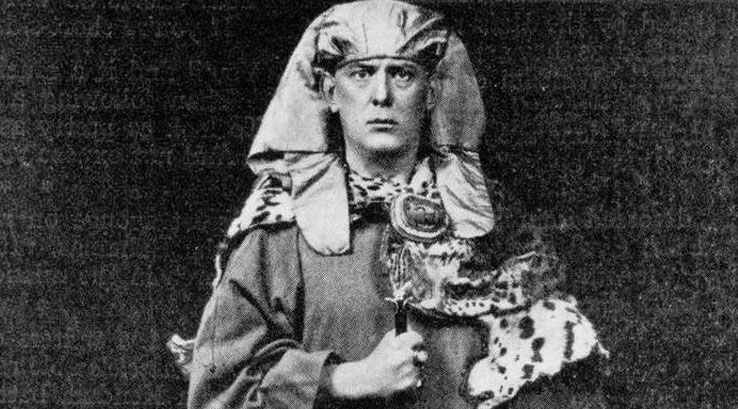History Lesson: How "The Wickedest Man In The World" Changed It Forever
Aleister Crowley has a bit of a mixed reputation. Both famous and infamous, many of his ideas from the early 20th century have become part of the modern world.

Occultism - that is, knowledge and belief in the paranormal - has a long history in Egypt. From the times of the earliest Pharaonic kingdoms, ordinary citizens, as well as aristocracy, practiced a belief in magic and witchcraft. Spells to invoke the power of the gods were a part of everyday life - magic recitations to imbue the caster with the power of a specific god, and papyrus scrolls containing spells to preserve its possessor against attacks from those that dwell in the water. Moses arguably continued this trend, calling on the power of God to bring about plagues and destroy his enemies. At the turn of the 20th century, a young Englishman - already with fervor for the occult - came to Cairo on his honeymoon. The things that he alleges happened to himself and his new bride would launch a new religion and philosophy that would go on to influence everything from 1960s counterculture and The Beatles, to Satanism and heavy metal. The man, Aleister Crowley, whom while in Egypt had a revelation that would reverberate into the next millennia, became known in his day as The Wickedest Man In The World.
Aleister Crowley was born Edward Alexander Crowley in Warwickshire to evangelical Christian parents on October 12, 1875. His father was a travelling preacher, and young Aleister would often accompany him. When Crowley was 11, his father died, and he began to resent the faith he was born into, straining his relationship with his mother. She began to refer to him as ‘The Beast’ and Crowley loved it, further invigorating his growing anti-authoritarianism. He would go on to refer to himself as ΤΟ ΜΕΓΑ ΘΗΡΙΟΝ DCLXVI or The Great Beast 666.
A brewing contempt for Christianity manifested itself in school where he would bring up inconsistencies in the Bible to his teachers. Crowley began to outright reject the conservative values of his family, proverbially giving the finger to his mother and God by smoking and sleeping with prostitutes, from whom he actually ended up contracting gonorrhea. Eventually, he was sent away to school so his mother didn’t have to deal with all of his grossness. There he studied chemistry, developed an affinity for chess, and became an accomplished mountain climber. He also considered several careers and fell in love with literature and poetry.
Eventually, after a brief illness, Crowley abandoned “the futility of all human endeavor” and his potential careers to focus on the occult. He joined a secret society dedicated to the occult called The Hermetic Order of the Golden Dawn. There he met several interesting, influential people who were also there to learn about the mysteries of the cosmos, including creator of Sherlock Holmes, Sir Arthur Conan Doyle, and Bram Stoker, who penned Dracula. Not long after joining The Golden Dawn, Crowley’s abrasive tendencies created rifts within the order. His open bisexuality (same-sex relations were illegal at the time) and other deviances earned him the ire of numerous members, poet W. B. Yeats among them.
Crowley traveled the world, visiting India, where he began practicing yoga - way before any of your cool friends in Zamalek starting doing it. He got married in Paris and spent part of his honeymoon in - you guessed it - Cairo.
In 1904, Crowley and his new wife, Rose, rented an apartment. He began studying Arabic and became interested in Islamic mysticism. Part of the apartment Crowley rented became a dedicated shrine where he attempted to invoke ancient Egyptian deities. Crowley later records that his Rose became really weird, and often delirious. She informed him that “they are waiting for you,” leading him to the Egyptian museum and telling him that the god, Horus, wanted a word. She led him to an exhibit of an artifact portraying Horus and told him, “The Equinox of the Gods has come.” Conveniently, the exhibit’s number was 666. What a coincidence.
Now it’s not clear whether or not Rose was a total whack-job beforehand or if Crowley just brought out the crazy in her, but not long after their trip to the museum, Crowley started to hear a voice in his head. He claimed it to be Aiwass, a messenger of Horus. Crowley wrote down everything Aiwass told him over three days and called it Liber L vel Legis, or The Book of the Law. Humanity was entering a new era, said Aiwass, and Crowley was to be its prophet. The book served as the foundation for Crowley’s new religion, Thelema. The only law of this new faith was “Do what thou wilst,” basically commanding that each person act according to their true will and not suppress their urges or desires.
“The unveiling of the company of heaven,
Every man and woman is a star.
Every number is infinite; there is no difference"
This particular passage from Crowley's The Book Of Law demonstrates his ideas regarding gender equality, considered radical at the time. At a time when the majority of the world had denied women the right to vote, Crowley wrote, "We of Thelema say that 'Every man and every woman is a star.' We do not fool and flatter women, we do not despise and abuse them. To us, a woman is herself, absolute, original, independent, free, self-justified, exactly as a man is.”
Defy conventions and live as one wants without infringing on the will of others, an integral part of Thelema was finding, pushing, and sometimes exceeding boundaries. Crowley was a voice for gender equality, spoke out against the abuse of children, championed the expansion of the mind through drugs - such as hashish and cocaine - and was all for the acceptance of homosexuality. Of course, in exceeding his boundaries, he did some pretty weird and questionable things, too.
Rumours of rituals involving copious amounts of drugs, sex, and even sometimes attempted bestiality, caused a British tabloid to label him “The Wickedest Man In World.” Crowley was prescribed heroin for his asthma, which was totally normal back then, and became addicted to it. He served as a spy during WWI and, during the Second World War, became friends with Roald Dahl, of Charlie and the Chocolate Factory fame, and Ian Fleming, who wrote the James Bond novels. He continued to study the occult, lea and found secret magic societies, and travelled the world. He died in 1947, allegedly penniless, in a boarding house in England.
Though Crowley was a figure of absolute evil to the establishment of the day, and may have definitely been involved in some weird stuff, the influence of his work is undeniable. The Beatles featured him on the cover of Sgt Pepper’s Lonely Hearts Club Band (which was censored to block his face); Led Zeppelin inscribe “Do What Thou Wilst” on the vinyl of their III album; even David Bowie and Ozzy Osbourne talk about him in their music. He influenced Wicca, and some of the organisations Crowley was associated with persist to this day. The "free love" philosophy of the 60s also owes some credit to Crowley. Though he is wrongly associated with the atheistic Church of Satan, founded in 1966, there are similar themes, such as the promotion of self-fulfillment.
Aleister Crowley was many things - not all of them entirely good nor entirely evil. He promoted a lot of the ideas that have become and are becoming a part of the world we live in, and his defining moment happened here, in Cairo.
- Previous Article Breaking News: Hurghada Hotel Attacked By Armed Assailants
- Next Article CSquare's Al Mafrood Webseries Tackles and Entertains
























